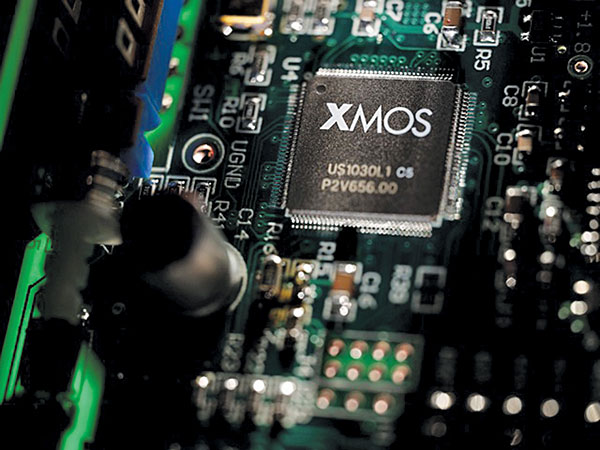| Columns Retired Columns & Blogs |
Can't play hi-rez SACDs. Can't play pure DSD files. That seems absurd for a player targeted at the audiophile market.
Pity - I like the design.
Back to the Sooloos and some recent releases from HDtracks.com. First the classics: the entire Rush catalog has been issued in 24/96. The sound ranges from challenged to inspiring, but in almost all cases it bests the CD versions of the dozen or so albums I have. How the music strikes you will be another matter. I tend to favor their middle and recent periods. The early releases are the troubled-sounding recordings, but I was impressed with the impact and presence of the King Crimson–like Snakes and Arrows, from 2005, as rendered by the Romulus: tight, punchy drums and bass, with Geddy Lee's voice floating on top. Still, that metallic sheen, especially on cymbals, that plagues so many rock recordings distracts even with tubes. I searched for something better.
Doing this listening in the summer of 2013, I didn't have to look far. Daft Punk's Random Access Memories (CD, Columbia 88883716862) is pretty much everywhere, and HDtracks even has a 24/88 version for us audiophiles. A debate in the Stereophile office swirled around whether the music is enlightened or lightweight, but in HD, the sound itself is stunning. Daft Punk spent over a million bucks to record this album, employing live musicians, analog outboard effects, and Pro Tools HD tracks, which were then mixed to several formats of analog and DSD. Bob Ludwig mastered.
Here, the Romulus had deep bass and dynamic impact as good as I've heard, with clear details and depth. I still had the Wadia 121decoding computer that I reviewed in July on hand, and did a brief comparison. The Wadia added a slight cloud all around and was sent back to its box. Still, it seemed that the Romulus might be doing something very subtle to the sound—but what? To nail it down, I called a couple audio pals over and we submitted it to further scrutiny.
Three Happy Chappies
Bruce Rowley has appeared before in my DAC reviews, but I also e-mailed my ex-retail partner, Jim Moyer, to give us a hand. Jim's been involved in high-end audio for several decades and has a great set of ears, having heard literally thousands of products. Both Bruce and Jim have tube systems, and clearly love what tubes can do for music.
I asked them to each pick three tracks, which would then be the basis of our testing. I picked one: Daft Punk's "Get Lucky," natch. We then played all seven tracks through the Romulus so that Bruce and Jim could refamiliarize themselves with my system and room. That done, we discussed our general impressions, then began to directly compare the Romulus with my trusty Benchmark, which I've always relied on as a known and fairly neutral reference.
First up were Jim's three selections: "Exit Strategy," by Colin Edwin; "Blood Sky," from Herd of Instinct; and "Song of the Dispossessed," from Dead Can Dance. Each is a superbly recorded song with sampled, electronic, and acoustic instruments, and with vocals on the Dead Can Dance track. First the Romulus, then the Benchmark. Back and forth.

The results were mixed. These tracks are loaded with complex passages and deep bass, and we all felt the Aesthetix added a bit more body and bottom-end weight overall, but that the Benchmark made it just slightly easier to pick everything out.
Next we ran through Bruce's tracks: "Guinnevere," from the HDtracks remastering of Crosby, Stills & Nash; the title track of Elton John's Madman Across the Water, also from HDtracks; and Jorma Kaukonen's "Genesis." All of these featured plenty of vocals and drew our attention to the Romulus's greatest strength: the reproduction of the human voice.
Bruce noted that, through the Romulus, voices blended better and sounded more natural, with a little more meat on them. I remarked that voices sound more acoustic, compared to the slight electronic quality they took on with the Benchmark. We all agreed that the Benchmark separated everything out a bit better, with Jim noting that the Romulus had just a little less depth.
We capped the day off with Daft Punk, which I could crank up a little higher now that we'd done most of our critical listening. Again, we reached consensus about the tradeoffs of bass, voices, and detail. Bruce and Jim rolled their eyes at the music, but both agreed that Random Access Memories sounded great through either DAC. Bruce concluded, "What you would prefer seems like an individual thing depending on how you listen to music: do you look for naturalness [the Romulus], or are you listening for the subtle details [the Benchmark]?" Jim and I nodded in agreement.
Conclusions
The Aesthetix Saturn Romulus compares favorably with any of the solid-state DACs I've had in the house, but adds a little sweetening in spots, most notably with voices and solo acoustic instruments such as cello or guitar. Whether you'll hear this small deviation from neutrality as a plus or a minus is a personal matter that will best be settled with an audition.
That said, the Romulus worked flawlessly and was a joy to use for the month and a half it sat in my system. The design, engineering, and build quality are top-notch for its price—and for the tube enthusiast, it's a no-brainer.

Can't play hi-rez SACDs. Can't play pure DSD files. That seems absurd for a player targeted at the audiophile market.
Pity - I like the design.

Jon,
Thanks for this review on another fine Aesthetix produce.

Thank you, Jon Iverson for the positive review of Romulus! Since publication, Romulus and Pandora Signature Editions have been released which play DSD 1X and 2X natively, among other upgrades. Non Signature units are factory upgradable. More information is available on our website at www.aesthetix.net.